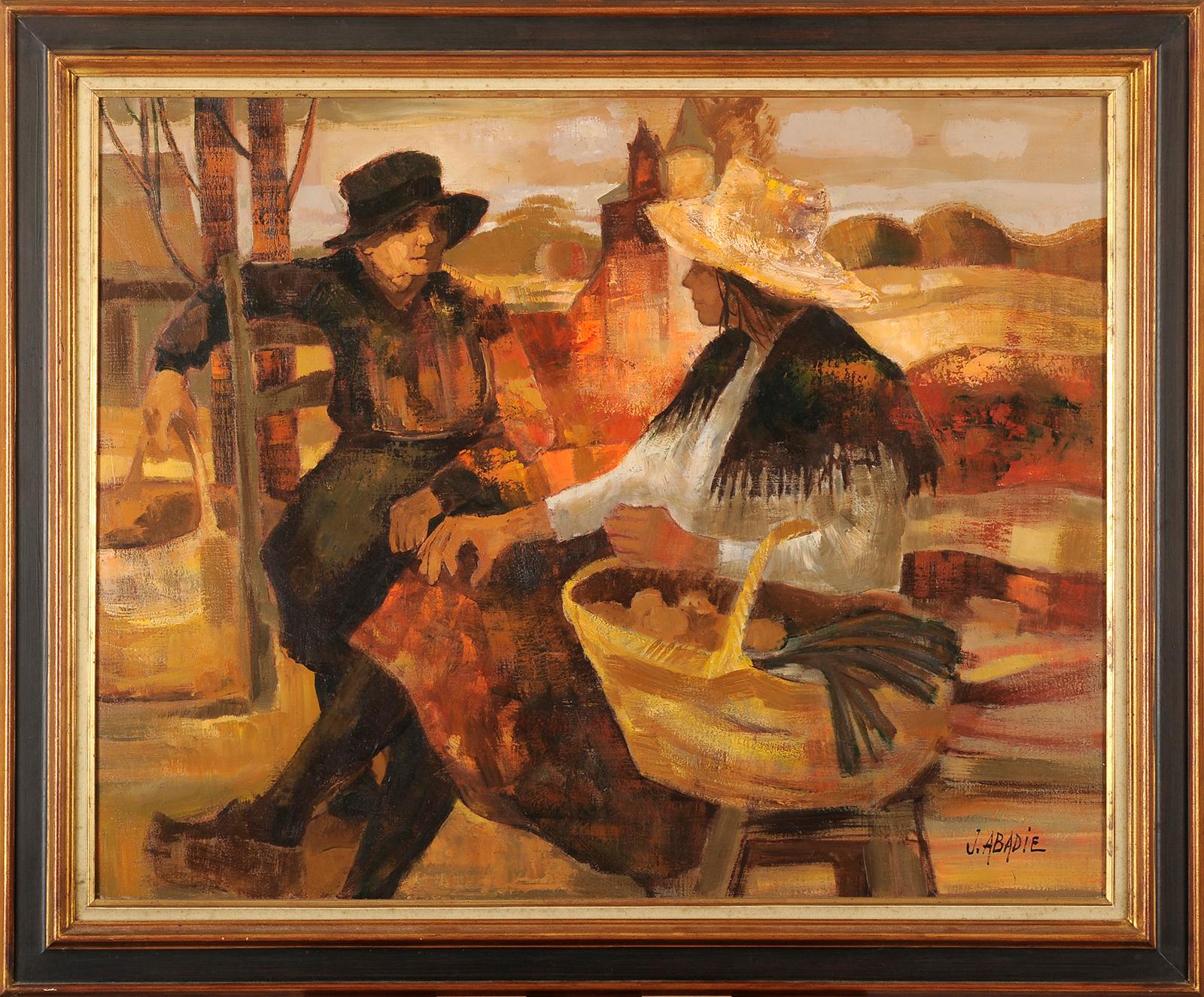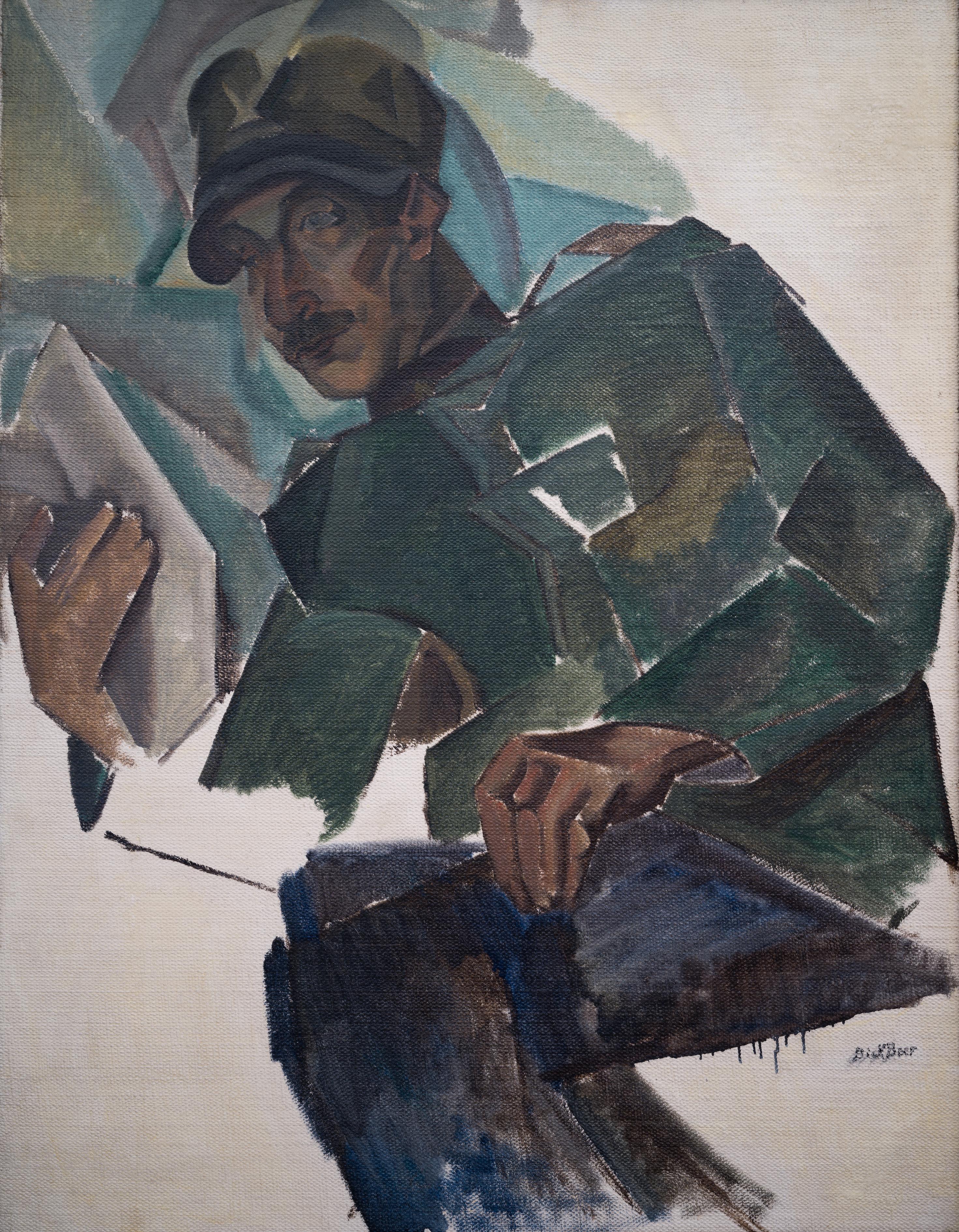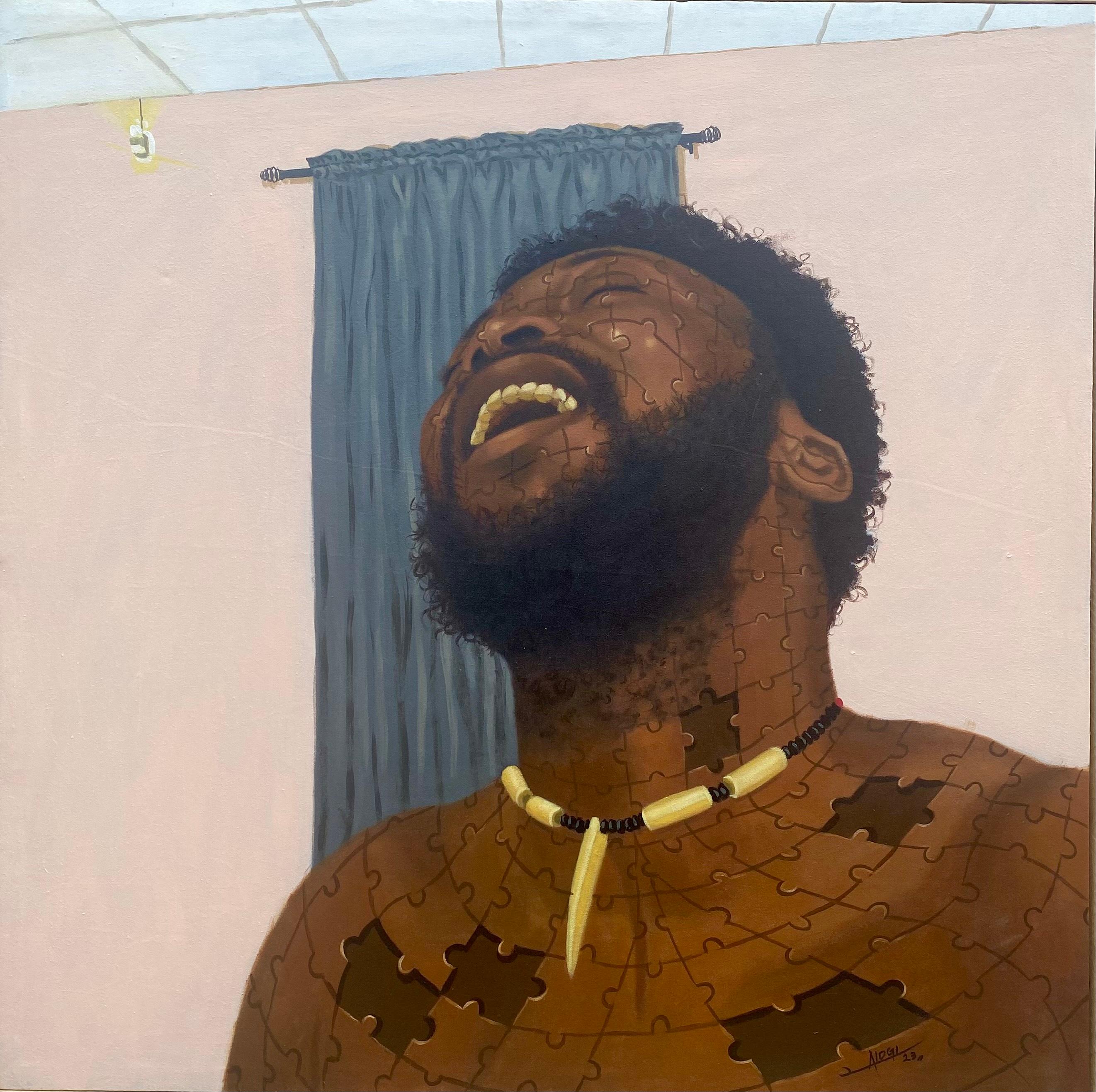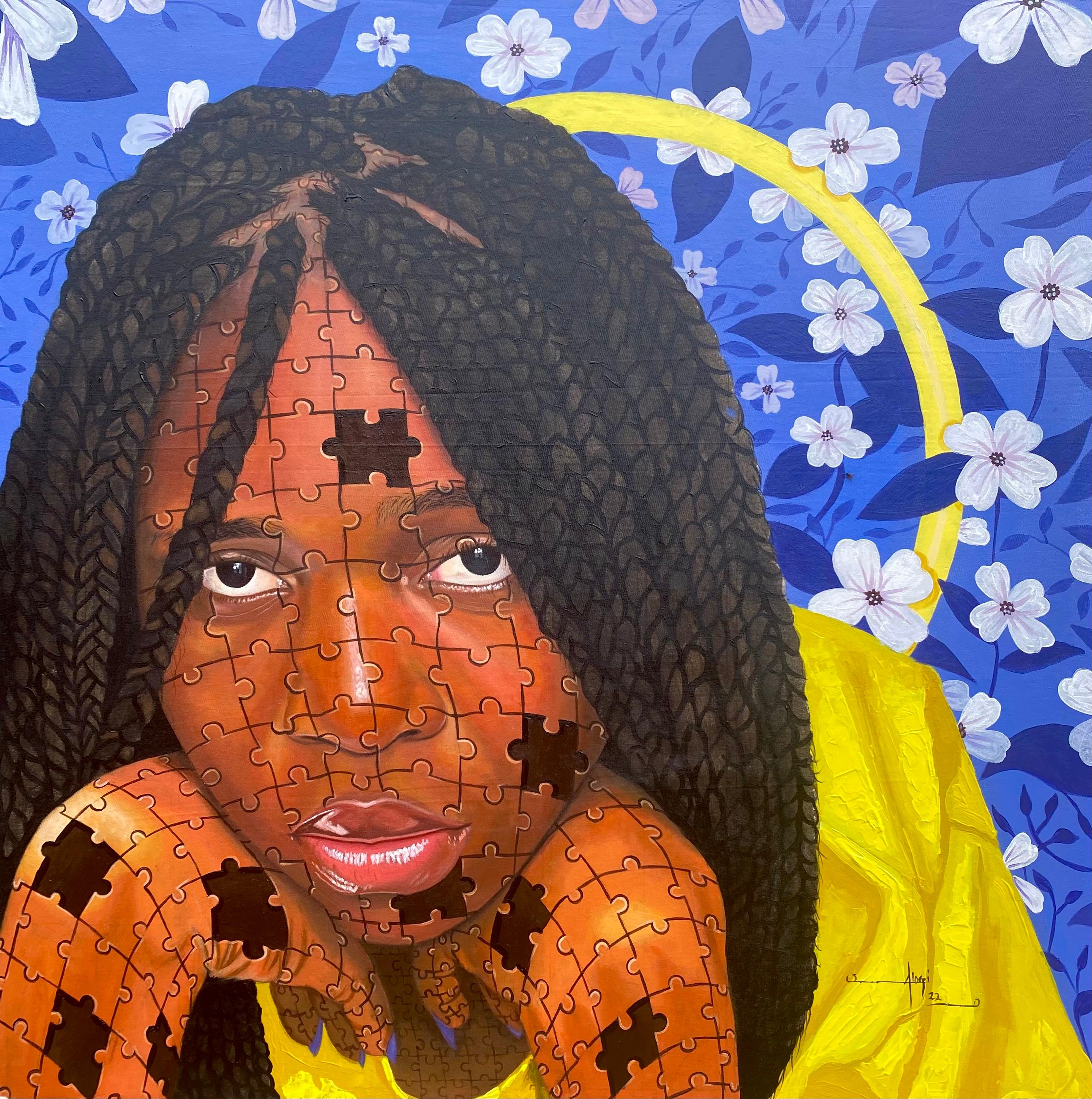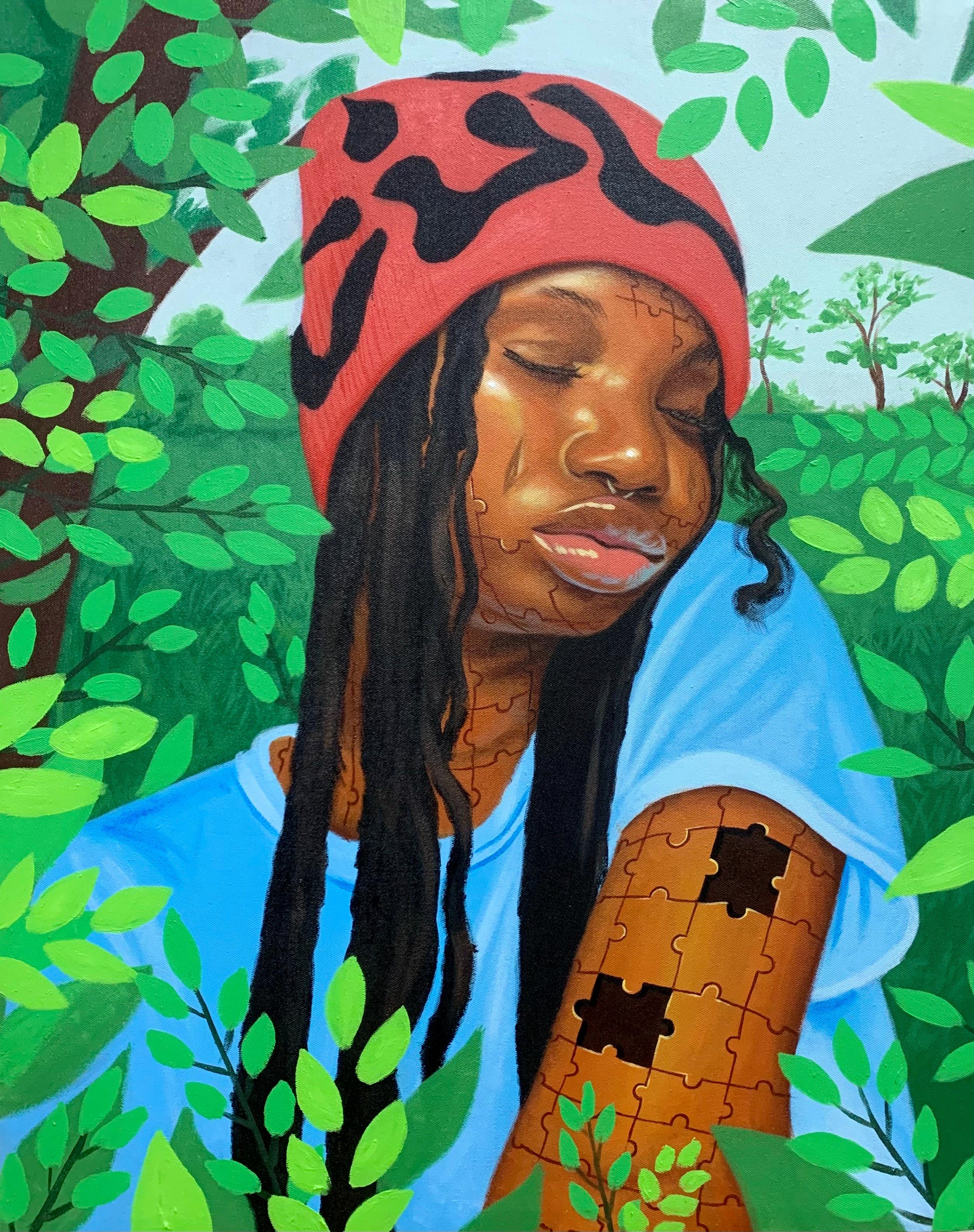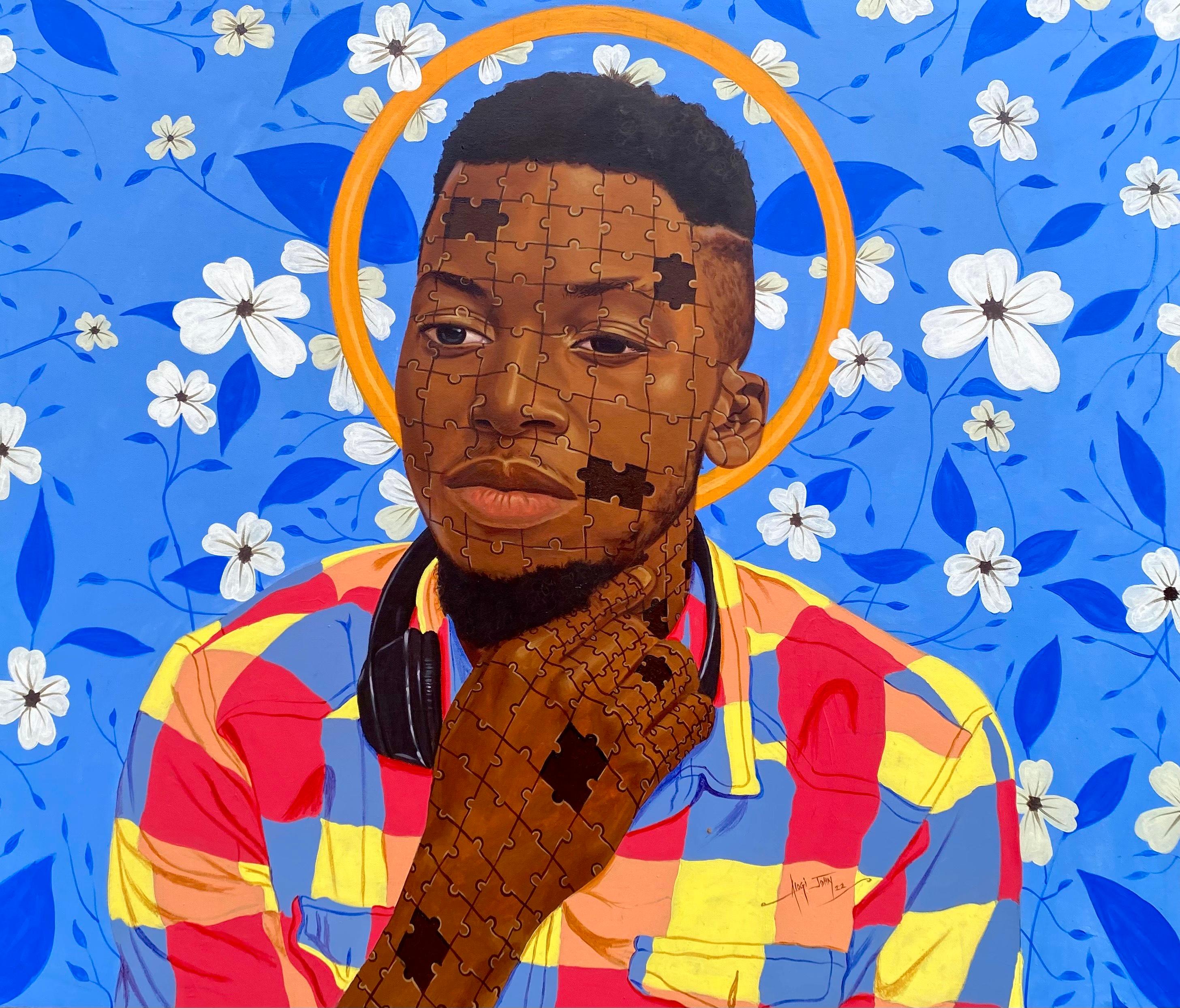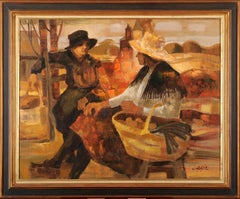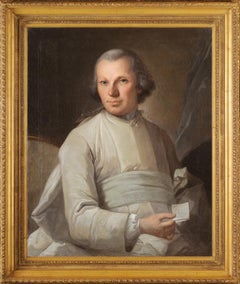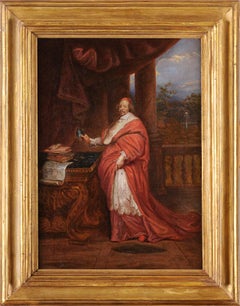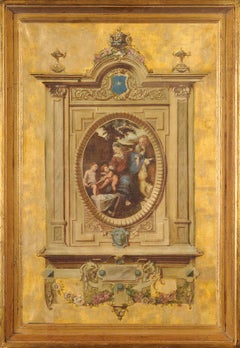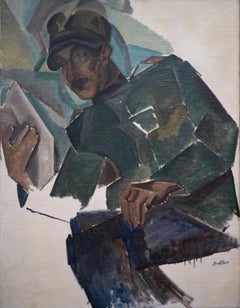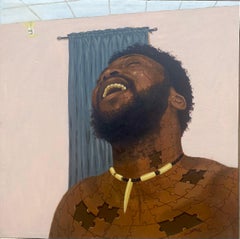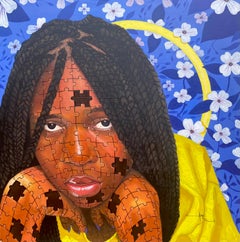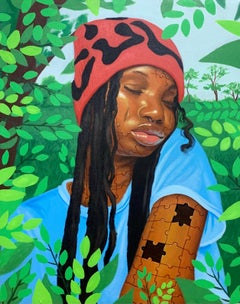Items Similar to Portrait of the artist's mother
Want more images or videos?
Request additional images or videos from the seller
1 of 5
Élisabeth Dujarric de La RivièrePortrait of the artist's mother1950
1950
About the Item
Elisabeth DUJARRIC de LA RIVIÈRE
(Jouy-en-Josas 1930 – Excideuil 2005)
Portrait of the artist's mother
Oil on canvas
H. 171 cm; L. 70 cm
Signed on the back
Provenance: Private collection, Périgord
Born in the heart of the Bièvre valley, a few kilometers from Versailles, Elisabeth Dujarric nevertheless comes from two important families, whose origins are elsewhere. She is the daughter of Marcelle Friedmann, whose parents have retained German ties, mainly in Berlin where Adolphe Friedmann is an eminent businessman. On his father's side, the Dujarric de la Rivière family have been living in Périgord for several centuries and their traces can be found in Agonac and Trélissac in the 18th and 19th centuries. It was in Saint Sulpice d'Excideuil in the northeast of the department that the family settled, at the famous Château de la Rivière with which they would adorn their name. Scholars, doctors, scientists, artists, the members of this family will bring some additional letters of nobility to Périgord. Elisabeth's father, an eminent researcher, will be a member of the Academy of Medicine in part for his discoveries on the Spanish flu. The Périgueux hospital still bears his name today. In this isolated Périgord house in the countryside, Elisabeth Dujarric will create a workshop where she will work in the summer, while she lives in Paris to get away from the harsh winters. Within the capital, she will be a fervent protector of the city of artists called "La Ruche", well known to lovers of modern art since a few young people without means have been able to create their works there, like Modigliani, Soutine , Léger, Laurencin, Zatkine, Dorignac and Chagall. After courses in Art History at La Sorbonne and passages through the Academies Jullian and de la Grande Chaumière, Elisabeth Dujarric will receive in 1957, the prize of the Salon de la Jeune Peinture held at the Musée d'Art Moderne de la city of Paris. This award is part of her first period of work where she developed a style all in materials, with broken perspectives, modified hues and focusing mainly on portraits and still lifes. In the 1960s, she changed her style, as evidenced by the exhibitions in the Parisian galleries of the time, where the artist produced subjects from everyday life in light colors with atypical framing and compositions.
Elisabeth Dujarric creates several series of full-length figures, on large format canvases. These paintings are studies that serve him for larger compositions, or works of expression in themselves. Here it seems that it is his own mother who is represented in a simple outfit and slippers. The first underlying plot is strong, almost violent and gives the upper layers a soul.
- Creator:Élisabeth Dujarric de La Rivière (1930, French)
- Creation Year:1950
- Dimensions:Height: 67.33 in (171 cm)Width: 27.56 in (70 cm)
- Medium:
- Movement & Style:
- Period:
- Condition:
- Gallery Location:BELEYMAS, FR
- Reference Number:1stDibs: LU1857211392842
About the Seller
3.0
Vetted Professional Seller
Every seller passes strict standards for authenticity and reliability
Established in 2017
1stDibs seller since 2022
Typical response time: 5 hours
- ShippingRetrieving quote...Shipping from: BELEYMAS, France
- Return Policy
Authenticity Guarantee
In the unlikely event there’s an issue with an item’s authenticity, contact us within 1 year for a full refund. DetailsMoney-Back Guarantee
If your item is not as described, is damaged in transit, or does not arrive, contact us within 7 days for a full refund. Details24-Hour Cancellation
You have a 24-hour grace period in which to reconsider your purchase, with no questions asked.Vetted Professional Sellers
Our world-class sellers must adhere to strict standards for service and quality, maintaining the integrity of our listings.Price-Match Guarantee
If you find that a seller listed the same item for a lower price elsewhere, we’ll match it.Trusted Global Delivery
Our best-in-class carrier network provides specialized shipping options worldwide, including custom delivery.More From This Seller
View AllMarket in Dordogne - Périgord
By Jean Abadie
Located in BELEYMAS, FR
Jean ABADIE
(Tarbes 1921 – Ballan-Miré 2010)
Market in Périgord
Oil on canvas
H. 73 cm; L. 92 cm
Signed lower right
Provenance:
- Galerie France-Art, Paris, circa 1980
- Private col...
Category
1970s Cubist Portrait Paintings
Materials
Canvas, Oil
Portrait of a priest Prémontré
Located in BELEYMAS, FR
French school around 1760
Portrait of a Premonstratensian
Oil on canvas
H. 81 cm ; W. 65 cm
Traces of signature at the top left
Provenance: Private collection, Versailles
While the...
Category
1760s French School Portrait Paintings
Materials
Canvas, Oil
Cardinal Mazarin portrait
Located in BELEYMAS, FR
French School circa 1645
Portrait of Cardinal Mazarin - Sketch
Oil on canvas
H. 41.5 cm; W. 27 cm
Provenance: Collection of the Reverend Georges Downing Bowles (1789-1863)
Would ...
Category
1640s French School Portrait Paintings
Materials
Canvas, Oil
Holy family under an oak tree on a gold background
Located in BELEYMAS, FR
French school circa 1870
Holy Family under an oak, after Raphaël, on gold background
Oil on canvas
H. 92 cm; W. 60 cm
This aesthetic curiosity takes up the very famous composition b...
Category
19th Century French School Portrait Paintings
Materials
Canvas, Oil
Portrait of a French man
By Jean Despujols
Located in BELEYMAS, FR
Jean DESPUJOLS
(Salles 1886 – Shreveport 1965)
Portrait of a Henri Martin, mayor of Saint Médard en Jalles (Gironde)
Oil on canvas
H. 75 cm; L. 60 cm
Signed lower right
around 1920/2...
Category
1920s French School Portrait Paintings
Materials
Canvas, Oil
Presumed portrait of Marie-Anne de Bourbon
By Nicolas de Largillière
Located in BELEYMAS, FR
Nicolas de LARGILLIERRE
(Paris 1656 – 1746)
Portrait of a woman, presumed to be Marie-Anne de Bourbon, Princess of Conti (1666-1739)
Oil on oval canvas
H. 8...
Category
Early 1700s French School Figurative Paintings
Materials
Canvas, Oil
You May Also Like
Cubist Portrait of Gabriele Varese (in Italian uniform), 1919
Located in Stockholm, SE
Dick Beer (b. London 1893 - d. Stockholm 1938)
Portrait of Gabriele Varese (in Italian uniform), 1919
oil on canvas mounted on panel
116 x 90 cm
stamp signature
Exhibited:
Solo exhibition, Stockholm, Nov-Dec 1917;
The Royal Academy Stockholm 1973;
Åmells Konsthandel – En internationell kubist, Stockholm & London 2008
Hälsinglands Museum 2011
Millesgården – Dick Beer – Impressionist & Kubist, 2012
Provenance:
Within the family Beer until today
Dick Beer was born in 1893 in London as Richard Beer, the youngest of five brothers. His father, John Beer (1853-1906), was a watercolourist who was born in Stockholm and had left Sweden at the age of 17. John Beer instructed his sons in drawing and painting, among other things. A number of sketchbooks bear testimony to the boys’ talent.
Dick Beer’s parents died in 1906 and 1907. Barely 15 years old, Beer arrived in Sweden as an orphan. First he lived with relatives and finally he ended up at Reverend Laurell in Västergötland.
Dick Beer began his artistic studies at the Althin School of Painting in Stockholm in 1908 and continued at the Royal Academy of Arts in the autumn of 1910, but in September 1912 he broke off his studies and travelled to Paris. He rented a studio and enrolled at the Colarossi and Grande Chaumière academies.
In the summer of 1913, Dick Beer travelled to Pont-Aven in Bretagne in order to paint. In September the same year, he held his first solo exhibition in Stockholm which he gave the French title Exposition des tableaux de Bretagne et autour de Paris. The exhibition proved a success. Many of the paintings were executed in a light palette in a style inspired by the impressionists.
In 1914, Dick Beer undertook an extensive study trip to Italy, Tunis, Morocco and Spain, which resulted in canvases overflowing with colours and light. When the French army mobilised, he volunteered and was enlisted in the French Foreign Legion. In 1915 Dick Beer sustained severe head injuries in a grenade attack, which resulted in deafness and a nervous condition that would plague him for the rest of his life. Two of his brothers died the following year, fighting for the English army.
Dick Beer was hospitalised and convalesced at Château de Rochefort. Here he started painting again, in an impressionist style, a painting dominated by blue and green hues.
In 1918, Dick Beer married Ruth Öhrling, a dentist, and their son John was born later in the year. During this time, Beer began experimenting with cubist painting and created several large compositions, including the painting “The Arab Café”.
In the years that followed, Dick Beer was based in Paris, where he often moved house. He was instructed by André Lhote, who encouraged his students to work freely in the studio and provided them with individual critique. Beer often travelled to Bretagne or Provence. His artist friends came from all over Europe and included Amedeo Modigliani. Dick Beer exhibited fairly regularly in Paris between 1919 and 1934 and made a name for himself in French artist circles.
In the summers, Ruth regularly rented a house in the countryside, often at Lake Mälaren. She kept a large house with many models and friends and there was a lot of painting and discussions. In 1933, the couple divorced but Ruth still loved Dick and continued to support him financially for the rest of his life.
Dick Beer also exhibited in Sweden, albeit irregularly due to his failing health. In the 1920s and 1930s, Beer continued to pursue an expressionist painting with intense colours and unexpected perspectives, but eventually he veered towards more naturalistic forms, including a large number of nudes. He also painted several portraits of artists, politicians and writers.
In 1938, Dick Beer sojourned in Arles. The budding photographer Christer Strömholm...
Category
1910s Cubist Portrait Paintings
Materials
Canvas, Oil, Panel
$12,979 Sale Price
20% Off
Big Joy
By Alogi John
Located in Ibadan, Oyo
Shipping Procedure
Ships in a well-protected tube from Nigeria
This work is unique, this is not a print or other type of copy.
Accompanied by a Certificate of Authenticity.
About Ar...
Category
21st Century and Contemporary Cubist Portrait Paintings
Materials
Canvas, Acrylic
$2,000 Sale Price
20% Off
Ray of Hope
By Alogi John
Located in Ibadan, Oyo
"Ray of Hope" presents a compelling visual narrative that captures the viewer's attention with its elegant simplicity and emotive composition. The central focus is a lady, her eyes fixed on an unseen point, her hands gently supporting her face, and her flowing braided hair cascading down her shoulders. The artist skillfully employs light and shadow to accentuate the contours of her face, creating an ethereal glow that emanates from her serene expression. The painting's colors, a delicate blend of cool and warm tones, add a sense of depth and richness, further enhancing the artwork's emotional impact.
The lady's introspective pose and piercing gaze offer a profound glimpse into the human experience. With her hands gently cradling her face, she exudes a sense of vulnerability and introspection, as if lost in her own thoughts and dreams. The flowing braided hair adds an element of timelessness and femininity, while also symbolizing the fluidity and interconnectedness of one's hopes and aspirations. "Ray of Hope" serves as a reminder that within the depths of contemplation, a spark of optimism and resilience can emerge, guiding individuals toward a brighter future.
"Ray of Hope" finds its place within John Alogi's wider body of work, the "Dreams and Reality" series. This series explores the intersection between the subconscious and conscious mind, delving into the depths of human emotions, dreams, and aspirations. Each artwork within this collection invites viewers to question the boundaries between reality and imagination, offering glimpses into alternate worlds and unseen narratives. Alogi's unique ability to blend symbolism with evocative imagery gives birth to visual masterpieces that resonate with viewers on both intellectual and emotional levels.
Alogi's artistic style is characterized by a delicate balance between realism and poetic abstraction. His meticulous attention to detail, particularly in capturing facial expressions and the intricacies of hair, results in a stunning portrayal of human emotion. The artist's use of light and shadow creates a sense of depth and luminosity that brings his subjects to life. Alogi's choice of colors, often muted and harmonious, adds to the dreamlike quality of his artwork, enveloping viewers in a world of contemplation and introspection.
John Alogi's artwork, "Ray of Hope," captivates viewers with its mesmerizing portrayal of a lady lost in thought. As a part of his "Dreams and Reality" series, this masterpiece reflects the artist's profound understanding of the human condition, evoking a sense of introspection and emotional resonance. Through Alogi's skillful technique and symbolic imagery, the artwork transcends the boundaries of the canvas, inspiring contemplation and igniting a ray of hope within those who encounter it. "Ray of Hope" stands as a testament to the enduring power of art to touch the depths of our souls and remind us of the beauty and resilience within us all.
Painting
Ships in a well-protected tube from Nigeria
This work is unique, this is not a print or other type of copy.
Accompanied by a Certificate of Authenticity.
About Artist
Adeyemi John Damilare better known as Alogi John...
Category
21st Century and Contemporary Cubist Portrait Paintings
Materials
Canvas, Acrylic
$2,000 Sale Price
20% Off
Aridunu (One Who Makes One Happy When Sighted) -21st Century, Contemporary Love
By Alogi John
Located in Ibadan, Oyo
This is an embodiment of joy, a living canvas of warmth that brightens our days and transforms the ordinary into the extraordinary.
Àrídunnú “one who makes one happy when sighted”
S...
Category
21st Century and Contemporary Cubist Portrait Paintings
Materials
Canvas, Acrylic
$1,800 Sale Price
20% Off
Wild Dream - 21st Century, Contemporary, Figurative Portrait, Puzzle, Africa Men
By Alogi John
Located in Ibadan, Oyo
In the realm where the conscious meets the ethereal, where the boundaries of reality dissolve into the kaleidoscope of possibility, lies the concept of a "Wild Dream." This is not ju...
Category
21st Century and Contemporary Cubist Portrait Paintings
Materials
Canvas, Acrylic
$3,480 Sale Price
20% Off
Awaiting Your Call -21st Century, Contemporary, Figurative Portrait, Cubist Love
By Alogi John
Located in Ibadan, Oyo
Silently, I’m waiting
for your text
for your call
for your name in my notification
for you to meet me up
for you to hug me tight
for you to never let me go
for you to say I’m h...
Category
21st Century and Contemporary Cubist Portrait Paintings
Materials
Canvas, Acrylic
$1,560 Sale Price
20% Off
Recently Viewed
View AllMore Ways To Browse
Modigliani Portrait
Parisian Winter
19th Century Painting Lovers
Format Tie
Modigliani 1959
Slipper Light
Saint Sulpice
Elisabeth Dujarric De La Riviere
Medieval Fantasy
Virgin Mary Portrait
Young Man 18th Century Portrait
18th Century Female Portraits
18th Century Scottish Painting
Lady Barbara
Playboy Anniversary
18th Century Boy Portrait
Godfrey Knellor
Portrait Of Aristocratic Lady
